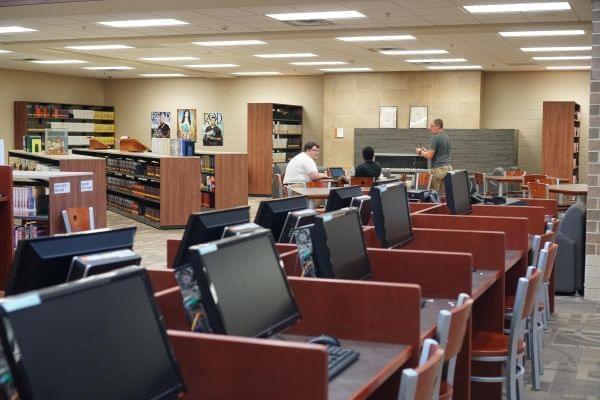With Data Breaches Soaring, Community Colleges Launch Cybersecurity Programs

DeKalb High School Spencer Tritt
More than four billion private records were exposed by data breaches in the first half of 2019.
Illinois residents have seen their fair share of information compromises. In July, the state received a share of the Equifax settlement.
These information hacks continue to dominate the headlines. The business of ensuring online privacy is also booming. Right now, there are nearly 3 million unfilled positions in cybersecurity.
Colleges are increasingly offering cybersecurity degree programs to prepare students to combat these online threats. In northern Illinois, several new programs are either launching or in development.
Illinois Valley Community College recently introduced cybersecurity courses. Instructors asked local businesses about their digital security needs.
"We brought some banks, we had hospitals and things like that, and they all were in," said Shane Lange, director of Workforce Development at IVCC. "They said, 'Hey if you can bring some students through a program that can help them protect our information, we're in.'"
IVCC is offering a cybersecurity associate degree and a Security+ certification. It's key for these new programs to forge connections with companies in the cybersecurity industry. Software and security are always evolving, so they want to make sure they're being pulled along the cutting edge with corporations like IBM and Microsoft.
Felix Davis know that. He's a professor in the information technology department at the College of DuPage.
"There's always going to be a lag in that because things are coming out as we speak, but it gives our program, our content, that capability," he said.
Their program is established. It even has a designation from the NSA and Department of Homeland Security as a Center for Academic Excellence. In addition to these honors, the school makes sure there are instructors in the classroom who are still active in the industry.
Nancy McDonald is teaching many of the new cybersecurity classes at Illinois Valley. She says things have changed drastically since she first got her certification.
"We were more concerned about incident response, disaster recovery," said McDonald. "And now we're trying to take care of a lot of phishing emails and how the hackers are getting in the ransomware, and all of that information."
These days, it's not just companies worried about their data -- it's everyday people.
"There's a term that we should all become familiar with called IoT: Internet of Things, or sometimes you'll hear IoE, Internet of Everything," said Davis. "The fact that there are so many new devices that have networking capability: cars, and TV, refrigerators, and online gaming and places."
McDonald says companies should know breaches are not a matter of if, but when. She adds they're rewarding hackers who find a bug, or software issue, before it can be exposed.
"Even the companies have raised their bug bounty to look for vulnerabilities. Apple just raised theirs to a million dollars," she said.
Lange at IVCC even got to witness a bug bounty being captured in-person at a conference. He says the "ethical hacker" exposed an issue with Bitcoin before someone less friendly could.
Over at Waubonsee Community College, they're still developing their cybersecurity program. It's scheduled to launch next year.
Ne’Keisha Stepney is the Dean for business and career technologies. She says she's also been a victim to widespread data breaches.
"Irony is very rich, like sitting at the table talking about the cybersecurity program and getting a notification that my data has been sold on the black market," said Stepney.
Stepney said Waubonsee is interested in cybersecurity education not just for their students, but for everyone in the community.
And yes, you probably should change your password.
"It should change your own behavior," said Professor Davis. "You start to look and realize, you know, my dog's name is not a good password."
For McDonald, soft skills, people skills, are one of the things these programs emphasize with their students to set them apart once they're in the field.
"There's not a patch for people to keep them safe," she said. "So you can patch your systems all you want, but you can't patch that human emotion of clicking and letting that in. Things are going to happen."
And it's a lucrative career choice. Cybersecurity analysts can earn in the six figures.

